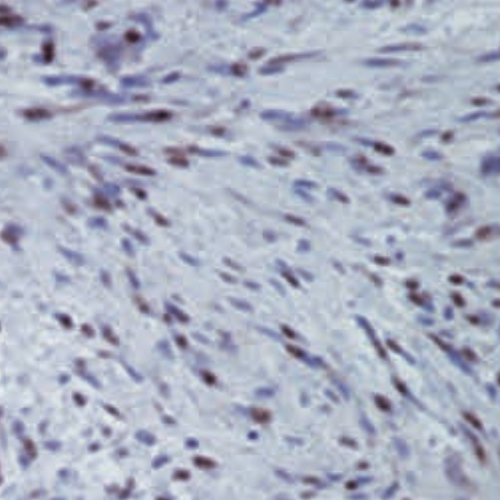Clinicopathological assessment of PD-1/PD-L1 immune checkpoint expression in desmoid tumors

All claims expressed in this article are solely those of the authors and do not necessarily represent those of their affiliated organizations, or those of the publisher, the editors and the reviewers. Any product that may be evaluated in this article or claim that may be made by its manufacturer is not guaranteed or endorsed by the publisher.
Accepted: 17 April 2023
Authors
The details of immune molecules' expression in desmoid tumors (DTs) remain unclear. This study aimed to determine the expression status of the programmed death-1/programmed death ligand 1 (PD1/PD-L1) immune checkpoint mechanism in DTs. The study included patients with DTs (n=9) treated at our institution between April 2006 and December 2012. Immunostaining for CD4, CD8, PD-1, PD-L1, interleukin-2 (IL-2), and interferon-gamma (IFN-γ) was performed on pathological specimens harvested during the biopsy. The positivity rate of each immune component was calculated as the number of positive cells/total cells. The positivity rate was quantified and correlations between the positivity rates of each immune molecule were also investigated. Immune molecules other than PD-1 were stained in tumor cells and intra-tumor infiltrating lymphocytes. The mean ± SD expression rates of β-catenin, CD4, CD8, PD-1, PD-L1, IL-2, and IFN-ɤ were 43.9±18.9, 14.6±6.80, 0.75±4.70, 0±0, 5.1±6.73, 8.75±6.38, and 7.03±12.1, respectively. The correlation between β-catenin and CD4 was positively moderate (r=0.49); β-catenin and PD-L1, positively weak (r=0.25); CD4 and PD-L1, positively medium (r=0.36); CD8 and IL-2, positively medium (r=0.38); CD8 and IFN-ɤ, positively weak (r=0.28); and IL-2 and IFN-ɤ, positively medium (r=0.36). Our findings suggest that PD-L1-centered immune checkpoint mechanisms may be involved in the tumor microenvironment of DTs.
Ethics Approval
The current study was approved by the Kindai University Ethics Committee (N. 31-187; Date 16 January 2020)How to Cite

This work is licensed under a Creative Commons Attribution-NonCommercial 4.0 International License.









